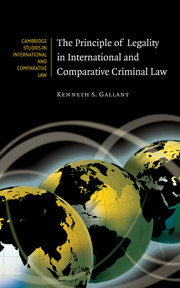Book contents
- Frontmatter
- Contents
- Explanatory Note on Spelling
- Acknowledgments
- Introduction
- 1 Legality in Criminal Law, Its Purposes, and Its Competitors
- 2 A Partial History to World War II
- 3 Nuremberg, Tokyo, and Other Postwar Cases
- 4 Modern Development of International Human Rights Law: Practice Involving Multilateral Treaties and the Universal Declaration of Human Rights
- 5 Modern Comparative Law Development: National Provisions Concerning Legality
- 6 Legality in the Modern International and Internationalized Criminal Courts and in the UN Trust Territories
- 7 Legality in Customary International Law Today
- Conclusion: The Endurance of Legality in National and International Criminal Law
- Appendix A Chart of Non-retroactivity Provisions in Criminal Law by Nations
- Appendix B Legality and Non-retroactivity Provisions as of 1946–47
- Appendix C Constitutional and Other National Provisions Implementing the Principle of Legality Today
- Bibliography
- Table of Authorities
- Index
- Afterword and Update
- CAMBRIDGE STUDIES IN INTERNATIONAL AND COMPARATIVE LAW
- References
6 - Legality in the Modern International and Internationalized Criminal Courts and in the UN Trust Territories
Published online by Cambridge University Press: 04 July 2009
- Frontmatter
- Contents
- Explanatory Note on Spelling
- Acknowledgments
- Introduction
- 1 Legality in Criminal Law, Its Purposes, and Its Competitors
- 2 A Partial History to World War II
- 3 Nuremberg, Tokyo, and Other Postwar Cases
- 4 Modern Development of International Human Rights Law: Practice Involving Multilateral Treaties and the Universal Declaration of Human Rights
- 5 Modern Comparative Law Development: National Provisions Concerning Legality
- 6 Legality in the Modern International and Internationalized Criminal Courts and in the UN Trust Territories
- 7 Legality in Customary International Law Today
- Conclusion: The Endurance of Legality in National and International Criminal Law
- Appendix A Chart of Non-retroactivity Provisions in Criminal Law by Nations
- Appendix B Legality and Non-retroactivity Provisions as of 1946–47
- Appendix C Constitutional and Other National Provisions Implementing the Principle of Legality Today
- Bibliography
- Table of Authorities
- Index
- Afterword and Update
- CAMBRIDGE STUDIES IN INTERNATIONAL AND COMPARATIVE LAW
- References
Summary
Those designing and implementing the statutes of the various modern international and internationalized criminal courts and tribunals have adopted the principle of legality as a core principle. The way in which this has been done has, however, varied among the courts.
All of the international and internationalized criminal courts have accepted the rule of nullum crimen sine lege (nothing is a crime without [preexisting] law) in one way or another. The ad hoc UN Tribunals for the Former Yugoslavia and for Rwanda (ICTY and ICTR, respectively) and the Special Court for Sierra Leone (SCSL) have done so without a formal provision in their statutes. The Rome Statute of the International Criminal Court (ICC) has several provisions implementing the principle. Three of the internationalized courts (Kosovo, East Timor, and now Cambodia) adopted the principle by reference to major international documents on human rights, and the East Timor court incorporated it explicitly into the law. The Iraqi Special Tribunal incorporated the principle by reference to applicable Iraqi domestic law.
The principle of nulla poena sine lege (no penalty may be imposed without [preexisting] law) has been slightly more problematic. Some theorists have stated that nulla poena does not truly apply to international criminal law.
- Type
- Chapter
- Information
- Publisher: Cambridge University PressPrint publication year: 2008

